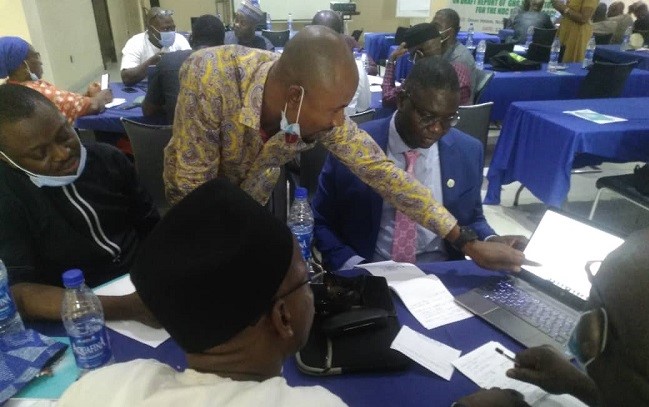Participants at the second day of the ongoing “Validation Meeting on Draft Report of Green House Gas (GHG) Emission Mitigation Assessment for Nigeria’s revised/updated Nationally Determined Contributions” on Tuesday, April 13, 2021 have expressed optimism that the robust intellectual inputs being made at the parley would help produce a more measurable, realistic, and credible document.

The document, which progressively upgraded Nigeria’s key performance indexes on the several deliverables from 20% to 50% cut down on climate inducing activities, when eventually validated, would be taken to the Federal Executive Council Meeting for adoption and thereafter become a working document for Nigeria’s commitments and contributions to the global efforts to address climate crisis in the next five years.
When it is eventually adopted by the FEC, the highest policymaking body in the country, the document will thereafter be forwarded to the United Nations headquarters in New York, United States of America, for recording in the Paris Agreement and monitoring and implementation purposes.
Unlike its 2015 NDC document, which was regarded as somewhat shallow, the new draft being validated entails a broader and verifiable data of the country’s multi-sectoral approaches to delivering on the new commitments.
For instance, in the draft report, it was projected that Nigeria can successfully cut-down 50% of its GHG emissions in the Agricultural Sector, relying on climate smart agriculture, 50% cultivated land adopting intermittent aeration of rice and paddy fields, and 50% reduction in infraction of crop residues burnt by 2030;
45% of its current GHG Emission on Transport, opening rail lines as a means of public transport, phasing out fossil fuel consuming motorcycles, tricycles; and exploring alternative sources of electricity generation, among others.
Under the draft, it was recommended that it was important for the nation’s Public Transportation Sector to jettison fossil fuel and allow for electrified transportation to permanently put the emission under check.
“There are different options on the plate because there are mass transit and heavy duty vehicles. We are looking at whether it would be viable to change their combustion engine or explore electric means of transportation 100%. There is also the option of Rail as an alternative to road transport,” Jessica Slater, one of the modelers, said in her technical session.
On Electricity, INDC is recommending 30kwts off-grid solar, which will greatly reduce reliance on the grid supply chain.
“This is one of the options on the table. Renewable energy like hydro and waste conversion are additional viable options waiting to be explored. The effort is to guarantee the arrival to zero reliance on generators by 2030,” Chris Millay added.
Oil and gas produces total of 24.5% national energy needs, and together with other subsectors, which make up the Energy Sectors are the principal emitters of greenhouse gases, hence the projection to cut down on gas flaring by 45% and 60% reduction in fugitive methane by 2030, according to the report.
Speaking with EnviroNews at the workshop, a participant, Bernard Agube, who is Manager, Operations and Clean Development Mechanism for the Nigeria National Petroleum Commission (NNPC), said significant progress being recorded at the second day of the parley revolved around the new grounds discovered on how to best reduce the emissions.
Adding that the acceptability and the eventual validation of the newly expanded deliverable targets on the country’s climate change efforts, as captured in the draft, would represent the bigger progress, Agube, explained that realising that there are better ways to reduce on the Oil and Gas Methane emission, represent another breakthrough in the revised NDC.
Acknowledging the need to wait for the final outcome on Wednesday, April 14 being the last day of the event, Agube, a member of the Drafting Committee for National Energy Balance, however said: “What can be termed as a progress from this Draft Report, is the fact that it was premised on a more reliable and verifiable industry data, which makes the deliverable realistic.”
Mr. Olagunju Kehinde Julius, Head, Energy and Environment, Nigeria Bureau of Statistics, disagreed with Agube, saying the aggregated data in the drafts were not encompassing enough, hence could still constitute a false representation in the future.
According to him, the major sources of data in the report include Arena and FAO, two agencies that have lesser coverage of current and most widespread knowledge of events in the country, hence the vulnerability of the said data.
“However, the progress being made here is that there would be recommendation to put a footnote in the report on this challenge and the need to mainstream these efforts in the next revision, which is in 2025,” he added.
By Bankole Shakirudeen Adeshina
